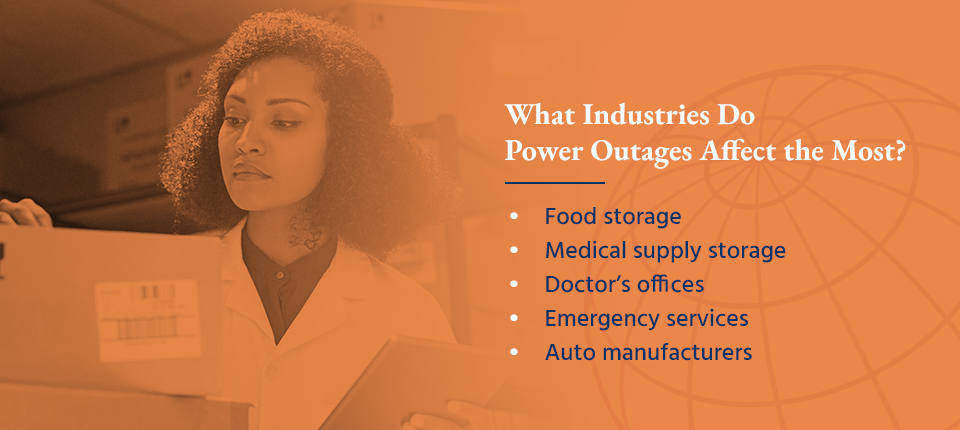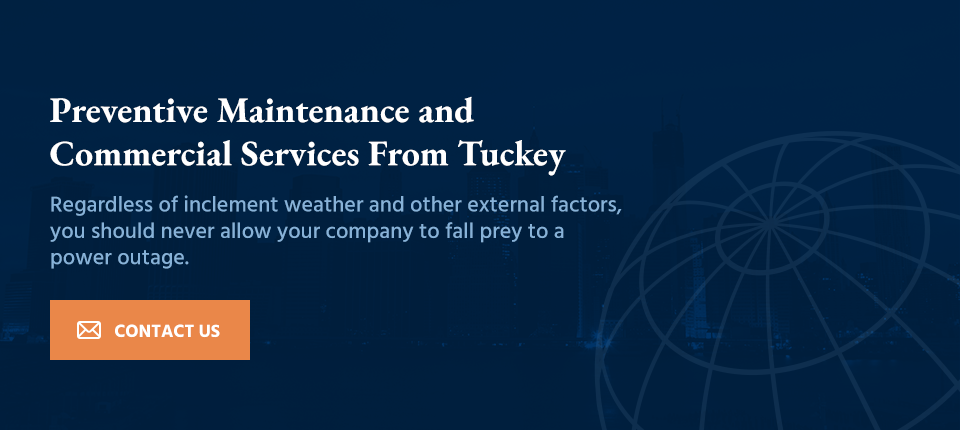Troublesome Effects of a Power Outage on a Business
October 30, 2019 | 12:35 pm
Throughout the industrial sector, few setbacks are as costly as a power outage. With so much time and money at stake, it is crucial to know how power outages affect businesses and what you can do to mitigate the loss.
Types of Power Outages That Commonly Affect Businesses
Power outages range from mild brownouts that can cause machines to blink to more permanent faults that can destroy equipment:
- Brownout: A momentary drop in power that causes the lights and screen on a computer to dim or flicker for a second. A brownout is close to a blackout but without the complete loss of power. Machines and computers will often survive brownouts, but each instance can weaken the chips and circuitry. A brownout could serve as a warning of worse things to come.
- Blackout: A complete loss of power where lights and screens shut off for several minutes or more. A blackout can cause a lot more damage than a brownout because all the affected machines are abruptly and improperly shut off. Some of today’s newer, more advanced computing devices are equipped to handle blackouts, but older devices are liable to fry.
- Permanent fault: When the power flat-lines across the grid, you have a permanent fault. These can last several hours or more and cause untold sums of money loss, especially at facilities where hourly productions amount to thousands of dollars. The more widespread the fault, the harder it becomes for service techs to pinpoint the source and rectify matters.
In large office buildings and factories, loss of the electrical power network supply can be financially devastating to all parties involved.
What Causes An Outage and What Are the Effects?
Power outages are caused by everything from blizzards and short circuits to collisions and rodents:
- Tech failure: Some of the biggest and costliest power outages are caused by technical failures, which can spread across company power grids and lead to untold damages. Technological failures are always a risk in computing systems and industrial facilities with complex systems of equipment. If a motherboard or wire short circuits or gets saturated with moisture, one failure can spark a chain reaction.
- Weather: Harsh storms can easily cause power failures, especially at buildings and factories that are not properly equipped for such events. If a blizzard or hurricane rips through a community, power lines and antennas can be struck down by hard wind, rain and lightning bolts.
- Vehicles: Factory vehicles and rolling stock will sometimes cause power failures by accidentally backing into or colliding with poles and power lines. Such accidents could easily occur at facilities where vehicles only have tight or narrow on-premise roadways. Power outages can also be caused by vehicles outside a company, such as when a truck accidentally crashes into a power generator.
- Spikes in voltage: Power outages can occur at random due to spikes in voltage. If an outlet has a power surge and sends excess volts into a connected circuit board with multiple attachments, each device that draws power from that outlet could be damaged or fried in an instant. Spikes are often caused by short circuits and sometimes occur during storms as the result of lightning.
- Animals: In some cases, power outages are caused by roaming animals. Rodents can be dangerous in this regard because they will get into the dark spaces of buildings and gnaw at power lines. Squirrels are among the leading culprits because they can climb up polls and tightrope across power lines.
Depending on the size and scope of the company affected, such outages can lead to millions in damages in just a few hours.
Learn About Our Electrical Services
What Industries Do Power Outages Affect the Most?
The majority of organizations estimate that a single hour of downtime can result in a six-figure loss. The impact of electricity blackouts is tremendous in the food, medical and automotive sectors for the following reasons:
- Food storage: Power outages are financially devastating for the food and beverage industry. The hardest-hit parts of the industry are usually the food storage facilities, where days and sometimes weeks’ worth of products can be spoiled due to a lack of proper refrigeration.
- Medical supply storage: Medicines must be properly stored at all times to preserve purity and freshness. If medical storage loses power for a few hours or more, medicines totaling thousands in value can be lost and spoiled within a matter of hours.
- Doctor’s offices: Hospitals and doctor’s offices must always have access to power. If a life support system or feeding tube loses power for just a few minutes, patients could be left in grave danger.
- Emergency services: If an emergency service suffers a power blackout, those that rely on that service could be in serious trouble. Emergency services exist to assist and help people in times of need. However, the objective is hard to fulfill when the service itself lacks power.
- Auto manufacturers: Some of the biggest losses from blackouts occur at auto factories. For example, if a factory makes 1,200 cars each day, that factory could lose tens of millions in a single day when you multiply the figure by the cost of each car.
Even the most state-of-the-art facilities are not completely safe from blackouts.
Developing a Plan for Power Outages
Disasters disrupt business, but with the following steps, you can prepare your company for serious power interruptions and still be productive with little or no loss:
- A business continuity plan: Create plans that detail what your employees should do if your facility loses power. This way, your staff can continue to operate in some capacity during the hours that your facility is without power.
- Emergency response drills. To ensure that your entire staff is equipped for all conceivable obstacles, hold emergency response drills periodically. Make sure that each person on your team understands his or her assignment in the event of a blackout.
- Purchase a UPS: To safeguard your company’s machinery and computing equipment from the threat of blackouts, install an uninterruptible power supply (UPS), which can keep your equipment powered for a certain amount of time during an outage. This will give your team the chance to work through the blackout or shut down the computers properly, if necessary.
- Install a power-backup device: To avoid downtime during a blackout, purchase a backup generator for your company. Make sure that the generator has sufficient size and capacity to power your company’s equipment for the expected duration of a possible blackout.
- Buy backup fuel: Keep a healthy supply of backup fuel on hand to ensure that your backup generator will work as expected when necessary.
Having a plan in place can help your company mitigate the overall cost of a power failure.
Preventative Maintenance and Commercial Services From Tuckey
Regardless of inclement weather and other external factors, you should never allow your company to fall prey to a power outage. For businesses in Harrisburg and Carlisle, PA, Tuckey Mechanical Services, Inc. is the most trusted name in emergency standby generators and whole building surge protection for South Central PA businesses. Contact us today for more information or to schedule an appointment.
All material Copyrighted (c) by the Tuckey Companies, 2025.




